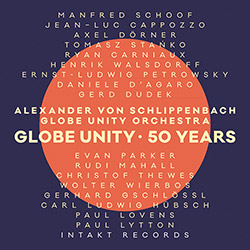
Fifty years after pianist Alexander von Schlippenbach joined the Manfred Schoof Quintet with the Peter Brotzmann Trio and named it the Globe Unity Orchestra, the ensemble is larger and stronger than ever, here celebrating the milestone in a band of 18 of the globe's most impressive improvisers, recorded live in a commanding concert at Jazzfest Berlin 2016.
Out of Stock
Quantity in Basket: None
Log In to use our Wish List
Shipping Weight: 5.00 units
Sample The Album:
Henrik Walsdorff-alto saxophone
Ernst-Ludwig Petrowsky-alto saxophone, clarinet, flute
Daniele D'Agaro-tenor saxophone, clarinet
Gerd Dudek-soprano and tenor saxophones, clarinet, flute
Evan Parker-tenor saxophone
Rudi Mahall-bass clarinet
Axel Dorner-trumpet
Manfred Schoof-trumpet, flugelhorn
Jean-Luc Cappozzo-trumpet
Tomasz Stanko-trumpet
Ryan Carniaux-trumpet
Christof Thewes-trombone
Wolter Wierbos-trombone
Gerhard Gschlossl-trombone
Carl Ludwig Hubsch-tuba
Alexander von Schlippenbach-piano
Paul Lovens-drums
Paul Lytton-drums
Click an artist name above to see in-stock items for that artist.
UPC: 7640120192983
Label: Intakt
Catalog ID: ITK298.2
Squidco Product Code: 25691
Format: CD
Condition: New
Released: 2018
Country: Switzerland
Packaging: Jewel Case
Recorded at Jazzfest Berlin 2016, in Berlin, Germany, on November 4th, 2016, by RBB,.
"The Globe Unity Orchestra is not just an ensemble of enormous historical importance to jazz but one which proves the continuing relevance of its self-imposed task. The present line-up, encompassing musicians of several generations and nationalities, lives up to the responsibility of producing genuinely new music, rejecting the commonplace and avoiding clich, each time they play together. As if to contradict those who accuse the Globe Unity Orchestra (and free jazz in general) of predictability, the golden jubilee at the Jazzfest Berlin was characterized by extreme contrast and high drama, both musical and visual. The audience was drawn in and engaged to a degree that became obvious when the end of Evan Parker's short unaccompanied soprano solo, almost midway through the 45 minutes, gave them a first chance to express their approval with a roar that can be clearly heard on the recording. At that moment, and others, they seemed unmistakably to be applauding not just individual contributions but the brilliance of the collective endeavour."-Intakt
"Pianist Alexander von Schlippenbach's Globe Unity Orchestra (GUO) employs a similar head-scratching process to that utilized to make geuze, a much-treasured Belgian beer. Both elicit the "how did they do that?" question, and both seem to be a gift from Mother Nature. Schlippenbach brings together a choice assemblage of improvisers, like the ingredients of guesze (wheat and three-year-old female cone hops), The beer and Globe Unity Orchestra are then animated by spontaneous processes. With the guesze, it is a fermentation by wild yeast found in the atmosphere, specifically from the valley of Zenne, west of Brussels. When this beer was first created back in the fifteenth century, what we know as yeast fermentation must have seemed like magic. GUO also draws on a type of spontaneous fermentation, one that we call free improvisation. Thus far, at least, there is no science to explain this magic.
This recording-made some fifty years after the pianist created a big band by combining the Manfred Schoof Quintet with the Peter Brötzmann Trio-is further proof that the mysterious musical alchemy continues. Sadly, some of the musicians that made up past editions of GUO-like Buschi Niebergall, Peter Kowald, Paul Rutherford, Kenny Wheeler and Derek Bailey-have passed, and others including Anthony Braxton, Han Bennink, Karl Berger, and Brötzmann, are no longer members. Luckily the spontaneous fermentation is an ongoing and renewable process with the introduction of new(er) orchestra members such as Axel Dorner, Rudi Mahall, and Jean-Luc Cappozzo.
And what is this free improvisation fermentation? Like those fifteenth-century Belgians, we have no scientific knowledge of how the transformation takes place. These eighteen musicians came together for the 2016 Berlin Jazzfest and produced forty-four minutes of instant composition out of thin air. They did so without noise, without overcrowding, and without a score. Credit must be given to the sound supervisor Wolfgang Hoff and engineer Peter Schladebach for capturing this large ensemble with so much detail that it allows us to identify Gerd Dudek's saxophone, clarinet, and flute, Mahall's bass clarinet, and Evan Parker's soprano saxophone. Those with more attuned ears can distinguish between Paul Lovens and Paul Lytton's drum work. GUO regulates its acceleration throughout, controlling the momentum, the volume, the soloing, and the matching of various players and sounds. Fifty years on, GUO seems to be tapping an inexhaustible source of magic."-Mark Corroto
Get additional information at All About Jazz
Artist Biographies
• Show Bio for Henrik Walsdorff "Henrik Walsdorff (* February 8, 1965 in Braunschweig) is a German jazz saxophonist. Walsdorff, who has been living in Berlin since 1994, studied saxophone at Herb Geller. He played in the bands of Aki Takase, Marty Cook and Sven-Åke Johansson. In addition to John Schröder and Colin Vallon, he is a member of the Fabian Gisler Quartet. With Martin High de Prime, Kay Lübke and Jan Roder, he is the group The Real Latinos, with John Schröder and Uli Jenneßen the group Freedom of Speech and with Rudi Mahall, Jan Roder and Oliver Steidle the SoKo Steidle. He is also a member of the Berlin Contemporary Jazz Orchestra under the direction of Alexander von Schlippenbach, with whom he also directs a quartet. In 1994, Walsdorf founded the group LAX with John Schröder, Gerold Genßler and Uli Jenneßen, whose album Time was created in 60 Seconds 2002. In the field of pop music he worked with the groups Seeed and We are heroes together." ^ Hide Bio for Henrik Walsdorff • Show Bio for Ernst-Ludwig Petrowsky "Ernst-Ludwig Petrowsky (born December 10, 1933 in Güstrow, often called Luten Petrowsky) is a German jazz musician. In addition to his work as a saxophonist, clarinetist and flute, he is also active as a composer and author. The autodidact Petrovsky is considered one of the founding fathers of jazz in the GDR. Already since the mid-1950s he played in various formations; later he became a founding member of important for East German jazz Manfred Ludwig Sextett and played with, among others, Joachim Kühn, Dorothy Ellison and Ruth Hohmann. In 1971 he founded the jazz rock band SOK with Ulrich Gumpert and in 1973 was one of the founders of the free jazz formation Synopsis. Since 1972 he has worked together with bassist Klaus Koch in various formations. Luten Petrowsky played in the various Gumpert Workshop Bands and from 1984 on the Synopsis successor, the Zentralquartett. He also interpreted compositions by Hans Rempel, Paul-Heinz Dittrich, Georg Katzer and Friedrich Schenker, with whom he also improvised. With Harry Miller, Heinz Becker, Joe Sachse and Tony Oxley he appeared in 1981 as part of the Jazzwerkstatt Peitz (CD: An Afternoon in Peitz). He became particularly popular since 1983 through his joint concerts with the singer Uschi Brüning. Petrovsky played regularly with the George Gruntz Concert Jazz Band in Europe and the United States. He was a member of the European Jazz Ensemble, Günter Lenz Springtime and the Tony Oxley Celebration Orchestra. He has also been active in the Globe Unity Orchestra for many years. Since 2006 he plays with Christian Lillinger and Oliver Schwerdt aka Elan Pauer in the New Old Luten Trio. On the occasion of his 80th birthday, the JazzFest Berlin Petrovsky honored with a Jubilee evening with three of his important groups, the Central Quartet, the existing since 1992 group reputation of home (with Thomas Borgmann, Christoph Winckel and Willi Keller) and the ensemble Ornette et cetera (with Brüning, Jeanfrançois Prins, Michael Griener) Petrowsky received the 1982 Art Prize of the GDR and was the winner of the National Prize of the GDR. In 1997 he was awarded the German Jazz Prize. Petrovsky is one of the most important German musicians of modern jazz. He was involved between 1963 and 2008 in 116 recordings of albums and other phonograms. Ernst-Ludwig Petrowsky is married to the singer Uschi Brüning." ^ Hide Bio for Ernst-Ludwig Petrowsky • Show Bio for Daniele D'Agaro "Saxophonist Daniele D'Agaro sounds like a natural match for great expat bebop trumpeter Benny Bailey on their 1999 album, Hidden Treasures (Nota). The two recorded nine rare compositions by saxophonist Don Byas; D'Agaro does an excellent job evoking the full-bodied tenor sound of the 40s and 50s, even as the swift rhythm section--including drummer Han Bennink--helps ground the music in the here and now. But that's just one trick in D'Agaro's bottomless bag. Gentle Ben, recorded with American bassist Mark Helias and Italian drummer Umberto Trombetta "Gandhi" and released the same year on the same label, includes a traditional Portuguese tune, a version of Monk's "Four in One," and a slew of catchy originals, all of which demonstrate D'Agaro's equal ease with playing straight and playing out there. Born in 1958 in Udine, Italy, near the Slovenian border, D'Agaro discovered jazz and improvised music in his teens, and before long he was working with Italian avant-gardist Andrea Centazzo. In addition to the tenor, he plays the clarinet, an instrument that lets him reveal his heritage in a folksy, melodic style. In 1983 he moved to Amsterdam, where he formed the trio Lingua Franca with cellist Tristan Honsinger and bassist Ernst Glerum; the group has done everything from interpreting Italian folk tunes to collaborating with a Senegalese singer. He returned to Udine in 1996, where he now leads, among other projects, the trio with Helias and Trombetta. For his Chicago debut D'Agaro will be joined by trombonist Jeb Bishop, bassist Kent Kessler, and drummer Tim Daisy; they'll improvise for most of the show, but reportedly they might throw in a Byas tune or two. Wednesday, July 18, 7 PM, Empty Bottle, 1035 N. Western; 773-276-3600." ^ Hide Bio for Daniele D'Agaro • Show Bio for Gerd Dudek "Gerhard Rochus "Gerd" Dudek (born 28 September 1938) is a German jazz tenor saxophonist, soprano saxophonist, clarinetist and flautist. Dudek studied clarinet privately and attended music school in the 1950s before joining a big band led by his brother Ossi until 1958. During the early 1960s, Dudek played in the Berliner Jazz Quintet, in Karl Blume's group and in Kurt Edelhagen's orchestra until 1965. He then became interested in free music and joined Manfred Schoof's quintet. Dudek took part in the first sessions of The Globe Unity Orchestra in 1966, and played with them at various time into the 1980s. He also worked with many other European free musicians and composers, including Alexander von Schlippenbach, Loek Dikker and The Waterland Ensemble And European Jazz Quintet. He is best known for his work with Manfred Schoof, Wolfgang Dauner, Lala Kovacev, the Globe Unity Orchestra, Berlin Contemporary Jazz Orchestra, Albert Mangelsdorff, Don Cherry and George Russell." ^ Hide Bio for Gerd Dudek • Show Bio for Evan Parker "Evan Parker was born in Bristol in 1944 and began to play the saxophone at the age of 14. Initially he played alto and was an admirer of Paul Desmond; by 1960 he had switched to tenor and soprano, following the example of John Coltrane, a major influence who, he would later say, determined "my choice of everything". In 1962 he went to Birmingham University to study botany but a trip to New York, where he heard the Cecil Taylor trio (with Jimmy Lyons and Sunny Murray), prompted a change of mind. What he heard was "music of a strength and intensity to mark me for life ... l came back with my academic ambitions in tatters and a desperate dream of a life playing that kind of music - 'free jazz' they called it then." Parker stayed in Birmingham for a time, often playing with pianist Howard Riley. In 1966 he moved to London, became a frequent visitor to the Little Theatre Club, centre of the city's emerging free jazz scene, and was soon invited by drummer John Stevens to join the innovative Spontaneous Music Ensemble which was experimenting with new kinds of group improvisation. Parker's first issued recording was SME's 1968 Karyobin, with a line-up of Parker, Stevens, Derek Bailey, Dave Holland and Kenny Wheeler. Parker remained in SME through various fluctuating line-ups - at one point it comprised a duo of Stevens and himself - but the late 1960s also saw him involved in a number of other fruitful associations. He began a long-standing partnership with guitarist Bailey, with whom he formed the Music Improvisation Company and, in 1970, co-founded Incus Records. (Tony Oxley, in whose sextet Parker was then playing, was a third co-founder; Parker left Incus in the mid-1980s.) Another important connection was with the bassist Peter Kowald who introduced Parker to the German free jazz scene. This led to him playing on Peter Brötzmann's 1968 Machine Gun, Manfred Schoof's 1969 European Echoes and, in 1970, joining pianist Alex von Schlippenbach and percussionist Paul Lovens in the former's trio, of which he is still a member: their recordings include Pakistani Pomade, Three Nails Left, Detto Fra Di Noi, Elf Bagatellen and Physics. Parker pursued other European links, too, playing in the Pierre Favre Quartet (with Kowald and Swiss pianist Irene Schweizer) and in the Dutch Instant Composers Pool of Misha Mengelberg and Han Bennink. The different approaches to free jazz he encountered proved both a challenging and a rewarding experience. He later recalled that the German musicians favoured a "robust, energy-based thing, not to do with delicacy or detailed listening but to do with a kind of spirit-raising, a shamanistic intensity. And l had to find a way of surviving in the heat of that atmosphere ... But after a while those contexts became more interchangeable and more people were involved in the interactions, so all kinds of hybrid musics came out, all kinds of combinations of styles." A vital catalyst for these interactions were the large ensembles in which Parker participated in the 1970s: Schlippenbach's Globe Unity Orchestra, Chris McGregor's Brotherhood of Breath, Barry Guy's London Jazz Composers Orchestra (LJCO) and occasional big bands led by Kenny Wheeler. In the late 70s Parker also worked for a time in Wheeler's small group, recording Around Six and, in 1980, he formed his own trio with Guy and LJCO percussionist Paul Lytton (with whom he had already been working in a duo for nearly a decade). This group, together with the Schlippenbach trio, remains one of Parker's top musical priorities: their recordings include Tracks, Atlanta, Imaginary Values, Breaths and Heartbeats, The Redwood Sessions and At the Vortex. In 1980, Parker directed an Improvisers Symposium in Pisa and, in 1981, he organised a special project at London's Actual Festival. By the end of the 1980s he had played in most European countries and had made various tours to the USA, Canada, Australia, New Zealand and Japan. ln 1990, following the death of Chris McGregor, he was instrumental in organising various tributes to the pianist and his fellow Blue Notes; these included two discs by the Dedication Orchestra, Spirits Rejoice and lxesa. Though he has worked extensively in both large and small ensembles, Parker is perhaps best known for his solo soprano saxophone music, a singular body of work that in recent years has centred around his continuing exploration of techniques such as circular breathing, split tonguing, overblowing, multiphonics and cross-pattern fingering. These are technical devices, yet Parker's use of them is, he says, less analytical than intuitive; he has likened performing his solo work to entering a kind of trance-state. The resulting music is certainly hypnotic, an uninterrupted flow of snaky, densely-textured sound that Parker has described as "the illusion of polyphony". Many listeners have indeed found it hard to credit that one man can create such intricate, complex music in real time. Parker's first solo recordings, made in 1974, were reissued on the Saxophone Solos CD in 1995; more recent examples are Conic Sections and Process and Reality, on the latter of which he does, for the first time, experiment with multi-tracking. Heard alone on stage, few would disagree with writer Steve Lake that "There is, still, nothing else in music - jazz or otherwise - that remotely resembles an Evan Parker solo concert." While free improvisation has been Parker's main area of activity over the last three decades, he has also found time for other musical pursuits: he has played in 'popular' contexts with Annette Peacock, Scott Walker and the Charlie Watts big band; he has performed notated pieces by Gavin Bryars, Michael Nyman and Frederic Rzewski; he has written knowledgeably about various ethnic musics in Resonance magazine. A relatively new field of interest for Parker is improvising with live electronics, a dialogue he first documented on the 1990 Hall of Mirrors CD with Walter Prati. Later experiments with electronics in the context of larger ensembles have included the Synergetics - Phonomanie III project at Ullrichsberg in 1993 and concerts by the new EP2 (Evan Parker Electronic Project) in Berlin, Nancy and at the 1995 Stockholm Electronic Music Festival where Parker's regular trio improvised with real-time electronics processed by Prati, Marco Vecchi and Phillip Wachsmann. "Each of the acoustic instrumentalists has an electronic 'shadow' who tracks him and feeds a modified version of his output back to the real-time flow of the music." The late 80s and 90s brought Parker the chance to play with some of his early heroes. He worked with Cecil Taylor in small and large groups, played with Coltrane percussionist Rashied Ali, recorded with Paul Bley: he also played a solo set as support to Ornette Coleman when Skies of America received its UK premiere in 1988. The same period found Parker renewing his acquaintance with American colleagues such as Anthony Braxton, Steve Lacy and George Lewis, with all of whom he had played in the 1970s (often in the context of London's Company festivals). His 1993 duo concert with Braxton moved John Fordham in The Guardian to raptures over "saxophone improvisation of an intensity, virtuosity, drama and balance to tax the memory for comparison". Parker's 50th birthday in 1994 brought celebratory concerts in several cities, including London, New York and Chicago. The London performance, featuring the Parker and Schlippenbach trios, was issued on a highly-acclaimed two-CD set, while participants at the American concerts included various old friends as well as more recent collaborators in Borah Bergman and Joe Lovano. The NYC radio station WKCR marked the occasion by playing five days of Parker recordings. 1994 also saw the publication of the Evan Parker Discography, compiled by ltalian writer Francesco Martinelli, plus chapters on Parker in books on contemporary musics by John Corbett and Graham Lock. Parker's future plans involve exploring further possibilities in electronics and the development of his solo music. They also depend to a large degree on continuity of the trios, of the large ensembles, of his more occasional yet still long-standing associations with that pool of musicians to whose work he remains attracted. This attraction, he explained to Coda's Laurence Svirchev, is attributable to "the personal quality of an individual voice". The players to whom he is drawn "have a language which is coherent, that is, you know who the participants are. At the same time, their language is flexible enough that they can make sense of playing with each other ... l like people who can do that, who have an intensity of purpose." " ^ Hide Bio for Evan Parker • Show Bio for Rudi Mahall "Rudi Mahall (born 1966 in Nürnberg, Germany) is a contemporary jazz bass clarinetist. While studying classical clarinet, Mahall shifted towards contemporary music, improvisation and jazz. He is, or was a member of following bands: Avantgardeband Die Hartmann 8, Der Rote Bereich (initially comprehending Frank Möbus, Marty Cook, Jim Black und Henning Sievert), the Trio Tiefe töne für Augen und Ohren (with Sievert and Bill Elgart), Carlos Bicas Azul and Die Enttäuschung (amongst others with Axel Dörner, Jan Roder). He carried out several projects and published CDs with Aki Takase, about the work of Eric Dolphy and others. Mahall participated to Alexander von Schlippenbach's recording of the complete works of Thelonious Monk, published by a prestigious Swiss label, and he is a member of the Globe Unity Orchestra. Moreover, he performed with Conny Bauer, Lee Konitz, Barry Guy, Karl Berger, Paul Lovens, Sven-Åke Johansson, Radu Malfatti, Ed Schuller, Ray Anderson, Kenny Wheeler, Hannes Bauer and many others. Mahall performed at the Free Music Festival Jazz à Mulhouse in 2008, at the Moers Festival, the JazzFest Berlin, the Leverkusener Jazztage and jazz festivals in New York City, Amsterdam, München, Würzburg, Nürnberg, and he toured in Portugal, southern and eastern Africa." ^ Hide Bio for Rudi Mahall • Show Bio for Axel Dorner "Axel Dörner (born 26 April 1964 in Cologne, Germany) is a German jazz musician (trumpet and piano) and composer. Dörner studied piano in the Dutch town Arnhem (1988-89) and at the Music Academy in Cologne (1989-1996). From 1991 he studied trumpet with Malte Burba, and during his studies he collaborated with trumpeter Bruno Light in the "The Street Fighters Duo". At this time he also joined the ensembles "The Street Fighters Quartet" and "The Street Fighters Double Quartet" together with Matthias Schubert, Bruno Leicht, and Claudio Puntin. In addition the "Axel Dörner Quartet" was initiated (with Frank Gratkowski, Hans Schneider and Martin Blume). With saxophonist Matthias Petzold. he participated on the albums Lifelines and Psalmen Und Lobgesänge. Dörner has resided in Berlin since 1994, and occurs in the most diverse settings like "The London Jazz Composers Orchestra" and with "Hedros" (together with Mats Gustafsson, Günter Christmann, Barry Guy and others). Since then he has contributed on more than 50 album recordings. Dörner is distinguished mainly by his versatility. He bouth play the more traditional Bebop, just like he fits in to classic Free Jazz or electronic music. He playd with Otomo Yoshihide at the Donaueschinger Musiktage in 2005. Dörner play both solo concerts and collaborates with his trio "TOOT" (together with Phil Minton and Thomas Lehn) and "Die Anreicherung" with Christian Lillinger, Håvard Wiik and Jan Roder, and in Ken Vandermarks "Territory-Band". Dörner is an integral part of the Berlin scene of experimental new improvisational music. Dörner was given special attention for his interpretation of all compositions by Thelonious Monk, with the pianist Alexander von Schlippenbach and his own band "Die Enttäuschung" released on a three CD album (Monks Casino, Complete 2005)."-Wikipedia ^ Hide Bio for Axel Dorner • Show Bio for Manfred Schoof "Manfred Schoof (born 6 April 1936) is a German jazz trumpeter. Schoof was born in Magdeburg and studied music in Kassel and Cologne. He is a founder of European free jazz and collaborated with Albert Mangelsdorff, Peter Brötzmann, Mal Waldron, and Irène Schweizer. He has interpreted Die Soldaten, an operatic work by the contemporary composer Bernd Alois Zimmermann. Schoof won various jazz prizes and is involved in the German musical rights association. Since 2007 he has been chairman of the Union Deutscher Jazzmusiker. He has been a professor in Cologne since 1990." ^ Hide Bio for Manfred Schoof • Show Bio for Jean-Luc Cappozzo "Jean-Luc Cappozzo was born in Belfort, France, in 1954. He started playing the trumpet in the local orchestra of his native town where he performed both jazz and classical music. Following a meeting with the diatonic accordionist Serge Desaunay, he started to perform traditional music as well. His meeting with Dizzy Gillespie in 1984, who invited him to participate in his concert, was a turning point in Jean-Luc Cappozzo's career. In 1988 he obtained the State Diploma of Professor of Jazz and subsequently taught trumpet improvisation at the Music School of Lyon (CNSM). He has taken part in various groups of musicians of the ARFI. He has been a member of he Louis Sclavis Quintet "L'Affrontement des Prétendants" and of Claude Tchamitchian's "Grand Lousadzak". In addition he has played in Sophia Domancich's Quintet "Pentacle", the Denis Fournier Quartet and with Joelle Léandre's Quintet "Fragments et suite lyrique". He has formed a quartet with Jean Aussanaire , Rémi Charmasson and Bernard Santacruz and created a musical work "Du Vent chez Johannes" with the Johannes String Quartet. In 2005 he joined the European Mythical Orchestra: the Globe Unity Orchestra. He has played with the Apollo Trio and composed duo s with the cellists Joelle Léandre or Eric Brochard, the singer Géraldine Keller, the drummer Paul Lovens, the tuba player Michel Godard, the pianist Umberto Petrin and the trumpet players Axel Dorner or Herb Robertson. Actually, he is playing with: - "The Bridge" with Joëlle Léandre (cb), Bernard Santacruz (cb), Mickaël Zerang (dms) and Douglas Ewart (sax - flûte) - - " Can You Hear Me" of Joëlle Léandre (cb) - " 2 ème étage " with Christine Wodrascka (p) and Gerry Hemingway (dms) - Duo with Famoudou Don Moye (dms) - Duo with Cécile Cappozzo (p) - Quartet à l'Ouest with Jean Aussanaire (sax), Eric Brochard (cb) and Alfred Spirli (dms) - Duo with Géraldine Keller (voice) - Duo with Eric Brochard (cb) - Trio with Didier Lasserre (dms) and Paul Rogers (cb) For his strength, his creativity, his magnificent sonority, the clarity of his phrasing, Jean-Luc Cappozzo is today an indispensable trumpet player on the European musical scene and is in increasing demand. Jean-Luc Cappozzo, powerful and mellifluous trumpet player, is "a discreet man who would blush to be labeled one of the most relevant soloists and the most complete on the French jazz scene. He may blush".(S. Siclier, Le Monde 1/08/2002)" ^ Hide Bio for Jean-Luc Cappozzo • Show Bio for Tomasz Stanko "Tomasz Stańko (born July 11, 1942) is a Polish trumpeter, composer and improviser. Often recording for ECM Records, Stańko is strongly associated with free jazz and the avant-garde. Coming to prominence in the early 1960s alongside pianist Adam Makowicz in the Jazz Darings, Stańko later collaborated with pianist Krzysztof Komeda, notably on Komeda's pivotal 1966 album Astigmatic. In 1968, Stańko formed an acclaimed quintet that included Zbigniew Seifert on violin and alto saxophone, and in 1975 he formed the Tomasz Stańko-Adam Makowicz Unit. Stańko has since established a reputation as a leading figure not only in Polish jazz, but on the world stage as well, working with many notable musicians, including Jack DeJohnette, Dave Holland, Reggie Workman, Rufus Reid, Lester Bowie, David Murray, Manu Katche and Chico Freeman. In 1984 he was a member of Cecil Taylor's big band. Stańko lost his natural teeth in the 1990s, although over time he developed a new embouchure with the help of a skilled dentist and monotonous practice. He would spend long hours playing what he deemed to be "boring" long tones which helped to strengthen his lip, in spite of playing with the disadvantage of false teeth." ^ Hide Bio for Tomasz Stanko • Show Bio for Ryan Carniaux "Ryan Carniaux (* 1980 in New York City) is an American jazz trumpeter. Carniaux, who grew up in Providence on Rhode Island, began playing the trumpet at the age of twelve; He played as a teenager in various bands, including in the jazz orchestra of John Allmark. On a scholarship, he studied at Berklee College of Music with Tiger Okoshi, Greg Hopkins, Phil Wilson, Ken Cervenka, Bill Pierce, Eddie Tomassie and George Garzone. In 2003 he moved to Europe, where he attended the masterclass at the Conservatory in Maastricht. Carniaux, who lives in Cologne today, leads his own quartet with pianist Mike Roehlofs, bassist Toms Baros and drummer Samuel Dhsler. In his 2011 debut CD Reflections of the Persevering Spirit he was also supported by Wolfgang Lackerschmid, with whom he went on tour in 2013. In the past he toured as a member of the Radovan Tari ka Sextet, with which he also recorded in 2009, and the Big Band by Peter Herbolzheimer. Since 2011 he belongs to Norbert Stein's Pata on the Cadillac (same-named CD, 2012); He is also a member of the gRoBA orchestra. He also starred with Mark Murphy, Benny Golson, Kidd Jordan, Ond ej tver ek, Florian Weber, Pablo Held and Thomas Rckert. Ryan Carniaux has been Professor of Jazz Trumpet since 2013 as successor to Uli Beckerhoff at the Folkwang University." ^ Hide Bio for Ryan Carniaux • Show Bio for Christof Thewes • occupations as trombonist, composer, arranger and intrumental teacher • leader of various ensembles und musical projects (solo through big band), ranging from mordern jazz, free improvisation und ćNeue MusikŅ to experimental rock, funk and pop music • present realization of this music as composer and leader in the musical groups Squakk, Undertone Project (Duo up to Octet ) Christof Thewes ŌThe Ascension FactorŌ (/Trio up to Tentet ) Quartetto Pazzo und Modern Chamber Trio, in the Free Jazz Band Yahoos, in the Big Band Little Big Band, in the Neue Musik Ensembles Modern Chamber Trio (Ensemble), in the Avantgarde-Popgruppe Phase 4, in dem Soloprojekt Trombonealone, in the Rock-Jazzformation The Matter of Taste, in the large ensemble Saarbrcker ŠDarmstdter Freundschaft, in the trombone ensemble Posaunenglanzterzet, in duos like Thewes-Mahall, RoderŠThewes, as member in groups like Squakk, Ensemble hks, Lacypool, Gutter Music, Anna Kaluza Quartet, Griener Š Roder ŠThewes, Birdfood and Bikini Big Band. • has been playing in Globe Unity Orchester and Uli Gumpert Workshop Band since 2008 • literary and musical cooperations with author, film maker und voice talent Alfred Gulden Gulden with the group GuldenŠThewes • Free improvisation concerts with Alexander von Schlippenbach, Paul Lovens, Evan Parker, Roger Turner, Willie Kellers, Uli Boetcher, Eddie Prevost, Tomas Ulrich, Matthias Schubert, Axel Drner, Olaf Rupp uva. • appearences on the following festivals in Europe, South america USA, Kanada : Jazzfestival Willisau, Unerhrt Festival Zrich, Jazz DÕOr Stra§bourg, Just Music Festival Wiesbaden, Jazzfestival Zagreb, Konfrontationen Nickelsdorf, Jazzfestival Nancy, Jazzfest Warschau, Jazzherbst Darmstadt, Jazzwerkstattfestival Berlin, Jazzfestival Mexico City , Jazzfestival Peitz, Jazzfestival Toronto uva. • contract compositions for city of Saarbrcken, Saarlndischer Rundfunk, Rundfunk Berlin-Brandenburg and Theatre National Du Luxembourg. • Awards: 2007 Š City of Worms Jazzpreis, 2005 Š City of Saarbrcken Medienpreis for Zyklus 1-6 with Alfred Gulden, 1992 Š District of Neunkirchen Kulturfrderpreis, 1987 Š City of Saarbrcken Kulturfrderpreis, 1985 Š Saarland Rockfrderpreis. • was trombone lecturer in academic programme of jazz at Saarland University of Music till 2011. • more than 30 published records as leader and sideman • cooperations with these musiscians: • Guitar: Olaf Rupp, Chris Klein, Thomas Honecker, Ralph Beerkircher, Simon Werner, Frank Wingold, Sven Prokaska, Frank Jacob • Piano: Uwe Oberg, Olli Maas, Georg Ruby, Alexander von Schlippenbach, Uli Gumpert, Manuel Krass, Christoph Mudrich, Bernd Thewes • Reeds: Hartmut O§wald, Rudi Mahall, Wolli Kaiser, Ernst Ludwig Petrowsky, Gerd Dudek, Evan Parker, Daniel dÕAgaro, Charlsey Haller, Udo Lovisa, Henrik Walsdorff, Michael Thieke, Ben Wolff, Ekkehard Jost • Trumpet: Daniel Schmitz, Daisy Becker, Ralf Himmler, Lars Kuklinski, Axel Drner, Jean Luc Capozzo, Manfred Schoof, Martin Klingeberg, Rainer Winterschladen • Trombone: Jrgen Seyler, Detlef Landeck, Albert Mangelsdorff, Nils Wogram, Johannes Bauer, Matthias Mller, Alisa Klein, Jan Kamp • Bass: Martin Schmidt, Jan
streich, Jan Roder, Jrgen Wuchner, Dieter Manderscheidt, Stefan Scheib, Ulla Oster, Robert Landfermann, Laurent Peckels, Mario Bartone • Drums: Daniel Prtzlich, Dirk Peter Klsch, Jrg Fischer, Michael Griener, Paul Lovens, Paul Lytton, Olli Strauch, Joe Bonica, Jochen Krmer • ^ Hide Bio for Christof Thewes • Show Bio for Wolter Wierbos "Wolter Wierbos (born 1 September 1957 in Holten, Overijssel) is a Dutch jazz trombonist. Wierbos has played throughout Europe, Canada, USA and Asia. Wierbos has many awards to his name, including the Podiumprijs for Jazz and Improvised music and the most important Dutch jazz award, the VPRO/Boy Edgar Award in 1995. Since 1979 he has played with numerous music ensembles: Cumulus (with Ab Baars and Harry de Wit), JC Tans & Rockets, Theo Loevendie Quintet, Guus Janssen Septet, Loos (Peter van Bergen), Maarten Altena Ensemble and Podiumtrio. He led his own band, Celebration of Difference, and has been involved in theater, dance, television and film projects. He has been invited to play with The Ex, Sonic Youth, Gruppo Sportivo and the Nieuw Ensemble (led by Ed Spanjaard). He has also played with Henry Threadgill, The Berlin Contemporary Jazz Orchestra (led by Alexander von Schlippenbach), the European Big Band (led by Cecil Taylor), the John Carter Project, Mingus Big Band (Epitaph, directed by Gunther Schuller). He is currently active with Misha Mengelberg's Instant Composers Pool (Down Beat Poll winner 2002, Talent Deserving Wider Recognition), Gerry Hemingway Quintet, Franky Douglas' Sunchild, Bik Bent Braam, Albrecht Maurer Trio Works, Nocando, Carl Ludwig Hübsch's Longrun Development of the Universe, Frank Gratkowski Quartet, Available Jelly and Sean Bergin's MOB. Wierbos also maintains a solo career. He has a running project under the name Wollo's World, where he brings together different artistic combinations, ranging from duos with tap-dancer Marije Nie and bassist Wilbert de Joode to a quartet with Misha Mengelberg, Mats Gustafsson and Wilbert de Joode. Wolter Wierbos can be heard on more than 100 CDs and LPs. He has released two solo CDs: X Caliber (ICP 032, 1995), "a round-trip tour of his horn, from buzzing mute mutations, grizzly blurts and purring multiphonics to radiant melodies", and Wierbos (DATA 824), a reissue of his 1982 solo LP with an additional track." ^ Hide Bio for Wolter Wierbos • Show Bio for Gerhard Gschlossl "Gschlößl studied trombone and composition at the Hochschule für Musik Würzburg. In 1997 he received a scholarship (Kulturpreisstipendium) from the city of Munich. He was part of the Deutsch-französischen Jazz ensemble of Albert Mangelsdorff and experiments with electronic sound effects. He studied in New York City with Ray Anderson and Conrad Herwig. He has been living in Berlin since 2004, where he mainly performs in small groups with Matthias Rosenbauer , Johannes Fink and Gebhard Ullmann. He also plays in Schnittmenge Meier with Matthias Schriefl , Robert Landfermann and Christian Lillinger. He is also a member of the Goodman-Bordenave Quintet. The trombonist can be heard on albums with Die Sterne ( Irres Light ), Hipnosis (a group of Wanja Slavin ), Rainer Temple , Sunday Night Orchestra, the Tied & Tickled Trio, Mindgames , Dani Felber , Johannes Lauer , Silke Eberhard , Andromeda Mega Express Orchestra , Kathrin Lemke 's Heliocentric Counterblast and Vesna Pisarović. He is co-founder of the Jazzkollektiv Berlin and the avant-garde and free jazz record label Trouble In The East Records." ^ Hide Bio for Gerhard Gschlossl • Show Bio for Carl Ludwig Hubsch "Besides his own project like Hübsch's Longrun Development of the Universe, Drift and Hübsch's Primordial Soup he founded the ENSEMBLE X and co-leads the Multiple Joy[ce] Orchestra together with Matthias Schubert and Frank Gratkowski. Hübsch is part of many collective projects and ensembles and works as side man in various projects. Carl Ludwig Hübsch performed with musicians like Arthur Blythe, Michiel Braam, Thomasz Stanko, Paul Lytton, Lester Bowie, Jasper vant Hof, Paul Lovens, Ernst Reijseger, Angelika Sheridan, Peter Keller, Thomas Lehn, Martin Theurer, Gunda Gottschalk, Axel Dörner, Ute Völker, Gino Robair, Philip Zoubek, Le Quan Ninh, Michel Doneda, Scott Fields, Michael Vorfeld, Uwe Oberg, Ulrich Phillipp, Franz Hautzinger, Sebastian Gramss, Nils Wogram, Frank Köllges, Udo Moll a.m.o. throughout the planet. He participated in numerous projects like e.g. • The F-Orkestra fellowships or study travels lead Hübsch troughout the continents, e.g.to India in 1997 for studies with Ramamani (Karnataka College of Percussion)or to Namibia in the year 2000, to the USA ( OMI-Arts Stipendium 2002) • but also to closer places like Essen (Jazzpott Award 2003 ) or to Basel (2008 / 2009 Residency of the Stiftung Bartels Fondation) Huebsch's work is documented in numerous radio and CD productions." ^ Hide Bio for Carl Ludwig Hubsch • Show Bio for Alexander von Schlippenbach "One of Europe's premier free jazz bandleaders, pianist Alexander von Schlippenbach's music mixes free and contemporary classical elements, with his slashing solos often the link between the two in his compositions. Schlippenbach formed The Globe Unity Orchestra in 1966 to perform the piece"Globe Unity, which had been commissioned by the Berliner Jazztage. He remained involved with the orchestra into the '80s. Schlippenbach began taking lessons at eight, and studied at the Staatliche Hochschule for Musik in Cologne with composers Bernd Alois Zimmermann and Rudolf Petzold. He played with Gunther Hampel in 1963, and was in Manfred Schoof's quintet from 1964 to 1967.Schlippenbach began heading various bands after 1967, among them 1970 trio with Evan Parker and Paul Lovens and a duo with Sven-Ake Johansson which they co-formed in 1976. Schlippenbach has also given many solos performances. In the late '80s, he formed the Berlin Contemporary Jazz Orchestra,which has featured a number ofesteemed European avant-garde jazz musicians including Evan Parker, Paul Lovens, KennyWheeler, Misha Mengelberg and Aki Takase. During the 90`s Duo work with Tony Oxley, Sam Rivers and Aki Takase. 1999 started performance and radiorecording of Thelonius Monks complete works, (all the compositions) with Rudi Mahall and his group "Die Enttäuschung"." ^ Hide Bio for Alexander von Schlippenbach • Show Bio for Paul Lovens "Born in Aachen, Germany, 6 June 1949; Drums, percussion, musical saw, etc. Paul Lovens played the drums as a child. Self-taught, from the age of 14 he played in groups of various jazz styles and popular musics and from 1969 has worked almost exclusively as an improvisor on individually selected instruments. He has worked internationally with most of the leading musicians in free jazz and free improvisation, among whom have included the Globe Unity Orchestra, the Berlin Contemporary Jazz Orchestra, the Schlippenbach trio, Quintet Moderne, Company, and a duo with Paul Lytton. He has undertaken concert tours in more than 40 countries, is a founder member of a musician's cooperative and has produced recordings for his own label, Po Torch Records since 1976. He has worked with painter Herbert Bardenheuer. Despite very rare solo performances, and although giving occasional concerts with ad-hoc groups and an involvement in projects with film, dance and actors, Paul Lovens' main interest and work is musical improvisation in fixed small groups. In the mid-1990s these small groups numbered around 16, of which a few were part of a special selection, called 'vermögen'. Paul Lovens somehow epitomises the free drummer/percussionist who is not there to lay down the beat and kick everyone else into action but to listen, colour, contribute, guide, and occasionally direct, the overall cooperative sound. In concert one cannot fail to be moved by his intensity and concentration and there is an overiding feeling that even the most random events are somehow planned in time. In this respect, there is a nice irony that on the Nothing to read CD with Mats Gustafsson, Lovens describes his kit as consisting of 'selected and unselected drums and cymbals'. Miking seems to be a problem at times with some recordings giving him undue prominence and others insufficient. Good recordings are Elf bagatellen, Nothing to read, Pakistani pomade, and ,stranger than love." ^ Hide Bio for Paul Lovens • Show Bio for Paul Lytton "Paul Lytton (born 8 March 1947, London) is an English free jazz percussionist. Lytton began on drums at age 16. He played jazz in London in the late 1960s while taking lessons on the tabla from P.R. Desai. In 1969 he began experimenting with free improvisational music, working in a duo with saxophonist Evan Parker. After adding bassist Barry Guy, the ensemble became the Evan Parker Trio. He and Parker continued to work together into the 2000s; more recent releases include trio releases with Marilyn Crispell in 1996 (Natives and Aliens) and 1999 (After Appleby). A founding member of the London Musicians Collective, Lytton worked extensively on the London free improvisation scene in the 1970s, and aided Paul Lovens in the foundation of the Aachen Musicians' Cooperative in 1976. Lytton has toured North America and Japan both solo and with improvisational ensembles. In 1999, he toured with Ken Vandermark and Kent Kessler, and recorded with Vandermark on English Suites. Lytton also collaborated with Jeffrey Morgan (alto & tenor saxophone), with whom he recorded the CD "Terra Incognita" Live in Cologne, Germany. He played also on White Noise's pioneer electronic pop music album An Electric Storm in 1969." ^ Hide Bio for Paul Lytton
4/9/2025
Have a better biography or biography source? Please Contact Us so that we can update this biography.
4/9/2025
Have a better biography or biography source? Please Contact Us so that we can update this biography.
4/9/2025
Have a better biography or biography source? Please Contact Us so that we can update this biography.
4/9/2025
Have a better biography or biography source? Please Contact Us so that we can update this biography.
4/9/2025
Have a better biography or biography source? Please Contact Us so that we can update this biography.
4/9/2025
Have a better biography or biography source? Please Contact Us so that we can update this biography.
4/9/2025
Have a better biography or biography source? Please Contact Us so that we can update this biography.
4/9/2025
Have a better biography or biography source? Please Contact Us so that we can update this biography.
4/9/2025
Have a better biography or biography source? Please Contact Us so that we can update this biography.
See also: http://www.tomaszstanko.com/profile/-Wikipedia (https://en.wikipedia.org/wiki/Tomasz_Sta%C5%84ko)
4/9/2025
Have a better biography or biography source? Please Contact Us so that we can update this biography.
4/9/2025
Have a better biography or biography source? Please Contact Us so that we can update this biography.
4/9/2025
Have a better biography or biography source? Please Contact Us so that we can update this biography.
4/9/2025
Have a better biography or biography source? Please Contact Us so that we can update this biography.
4/9/2025
Have a better biography or biography source? Please Contact Us so that we can update this biography.
• Oktoberorchestra Amsterdam 1994
• Humannoise Congress
• Hannes Zerbe / Willem Breuker Blech Band 1995
• Matthias Schubert Sextett 1997
• Kammeroper "Idyllen" von Thomas Beimel 1999
• Matthias Schubert Quartett 2002
• European Tuba Quartett from 2000
• Markus Eichenbergers Domino Orchestra 2003
• Toyteens `lil Rosies (Klare, Buhrs, de Jode, Hübsch)
• Post No Bills ab 1995
• Adam Noidlts Missiles
• Carl Ludwig Hübsch/Harald Kimmig Duo
• Adam Noidlts Missiles
• Thomas Heberers LipL from 2007
• Achim Krämer Georg Wissel Carl Ludwig Hübsch
• Franz Hautzingers Trompetenorchester 2008
• Bik Bent Braam / Braam Hybrid Tentett
• Ensemble [H]iatus from 2008
4/9/2025
Have a better biography or biography source? Please Contact Us so that we can update this biography.
4/9/2025
Have a better biography or biography source? Please Contact Us so that we can update this biography.
4/9/2025
Have a better biography or biography source? Please Contact Us so that we can update this biography.
4/9/2025
Have a better biography or biography source? Please Contact Us so that we can update this biography.
Track Listing:
1. Globe Unity Orchestra Š 50 Years 44:03
Intakt
Improvised Music
Jazz
Free Improvisation
European Improvisation and Experimental Forms
London & UK Improv & Related Scenes
Large Ensembles
Parker, Evan
Staff Picks & Recommended Items
Search for other titles on the label:
Intakt.


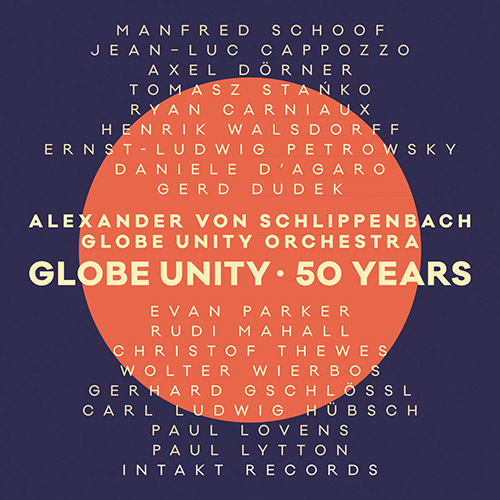
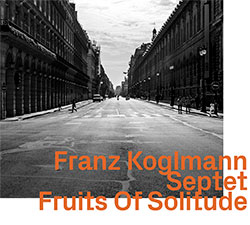
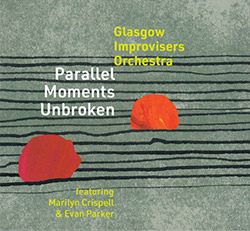
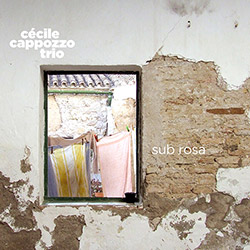

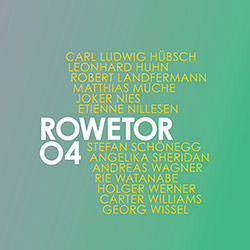


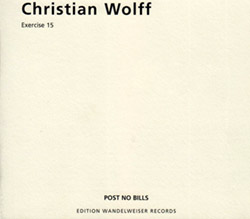

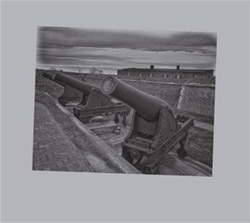
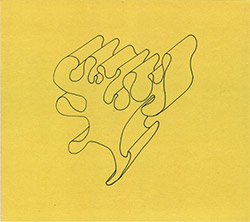
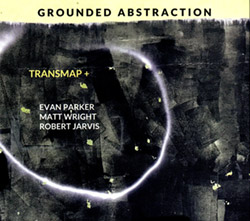
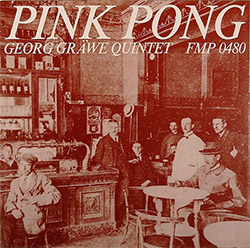
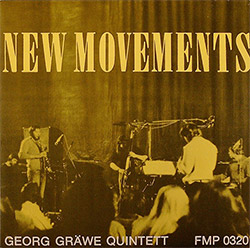
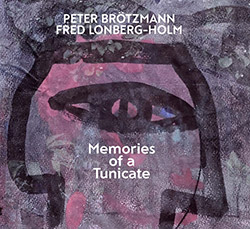
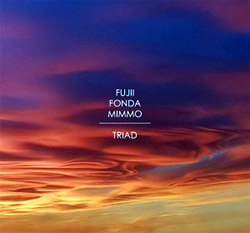
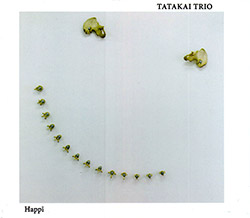


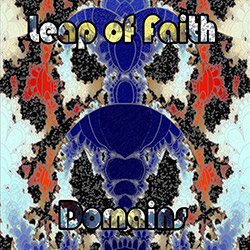
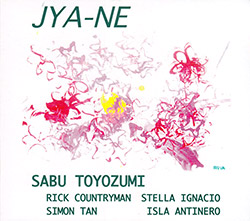
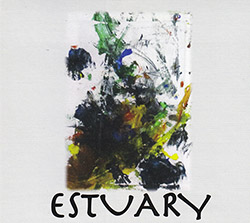
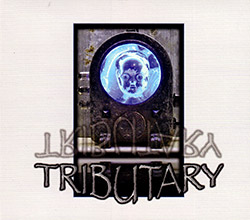

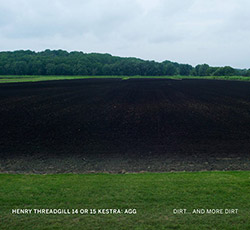




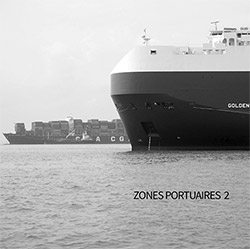
![111 (Michelle / Villamil): Live at Opus 40 [CASSETTE]](https://www.teuthida.com/productImages/misc4/35986.jpg)
![del Pino, Francisco / Charlotte Mundy: The Sea [CASSETTE]](https://www.teuthida.com/productImages/misc4/35987.jpg)

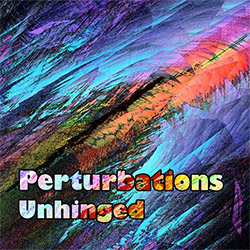

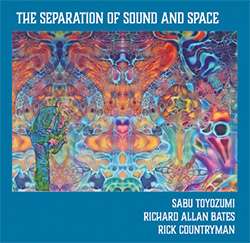
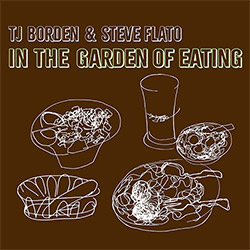

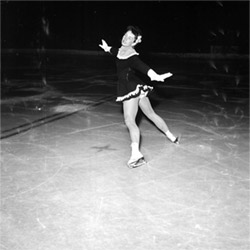
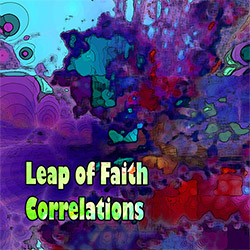

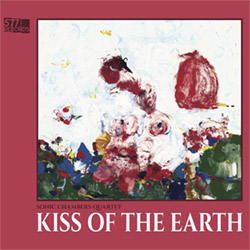

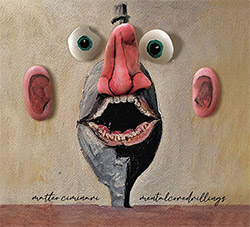
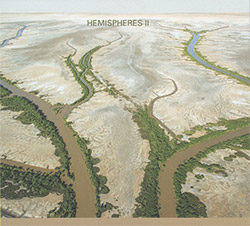
![Niblock, Phill / Anna Clementi / Thomas Stern: Zound Delta 2 [VINYL]](https://www.teuthida.com/productImages/misc4/34623.jpg)
![Yoko, Ono / The Great Learning Orchestra: Selected Recordings From Grapefruit [2 CDs]](https://www.teuthida.com/productImages/misc4/35841.jpg)

![Brotzmann, Peter / John Edwards / Steve Noble / Jason Adasiewicz: The Quartet [2 CDs]](https://www.teuthida.com/productImages/misc4/35975.jpg)
![Brotzmann, Peter / John Edwards / Steve Noble / Jason Adasiewicz: The Quartet [VINYL 2 LPs]](https://www.teuthida.com/productImages/misc4/35976.jpg)
![Thomas, Pat: The Solar Model of Ibn-Al Shatir [VINYL]](https://www.teuthida.com/productImages/misc4/36044.jpg)
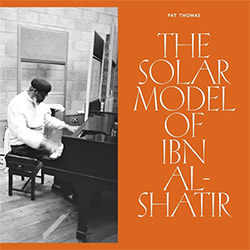



![Rodrigues, Ernesto / Nuno Torres / Guilherme Rodrigues: Whispers In The Moonlight - In Seven Movements [2CDs]](https://www.teuthida.com/productImages/misc4/35765.jpg)



![Cocks, Laura: FATHM [VINYL]](https://www.teuthida.com/productImages/misc4/36055.jpg)













![Schindler, Udo / Sandy Ewen / Damon Smith: Munich Sound Studies Vols. 4, 5 & 6 [3 CDs]](https://www.teuthida.com/productImages/misc4/35966.jpg)
![Turbulence Orchestra & Sub-Units: Smear Out the Difficulties (Double Live) [2 CDs]](https://www.teuthida.com/productImages/misc4/36048.jpg)

![Myers, David Lee : Tin Drop Tear [BOOK w/ DOWNLOAD]](https://www.teuthida.com/productImages/misc4/36030.jpg)

![Ackerley / Prymek / Turner: All Hope With Sleeping Minds [CASSETTE]](https://www.teuthida.com/productImages/misc4/35950.jpg)








![Olencki, Weston : Pearls Ground Down To Powder [VINYL]](https://www.teuthida.com/productImages/misc4/35956.jpg)
![Myers, David Lee: Oculus [2CDs]](https://www.teuthida.com/productImages/misc4/35857.jpg)


![dustsceawung: dustsceawung [CASSETTE w/ Download]](https://www.teuthida.com/productImages/misc4/35753.jpg)




![Halls of the Machine: Atmospheres For Lovers And Sleepers [CASSETTE w/ DOWNLOAD]](https://www.teuthida.com/productImages/misc4/35806.jpg)











![Zorn, John / JACK Quartet: The Complete String Quartets [2 CDs]](https://www.teuthida.com/productImages/misc4/35609.jpg)

![Lonsdale, Eden: Dawnings [2 CDs]](https://www.teuthida.com/productImages/misc4/35480.jpg)







![Sanna, Claudio: Compositori Sardi Contemporanei II [2 CDs]](https://www.teuthida.com/productImages/misc4/35317.jpg)







![Zurria, Manuel: Fame di Vento [3 CDs]](https://www.teuthida.com/productImages/misc4/35167.jpg)

![Electric Bird Noise / Derek Roddy: 8-10-22 [CD EP]](https://www.teuthida.com/productImages/misc4/35970.jpg)








![Elephant9 : Mythical River [VINYL]](https://www.teuthida.com/productImages/misc4/34624.jpg)



![Elephant9 with Terje Rypdal: Catching Fire [VINYL 2 LPs]](https://www.teuthida.com/productImages/misc4/35355.jpg)
![Deerlady (Obomsawin, Mali / Magdalena Abrego): Greatest Hits [VINYL]](https://www.teuthida.com/productImages/misc4/34876.jpg)







![Surplus 1980: Illusion of Consistency [CD]](https://www.teuthida.com/productImages/misc4/35069.jpg)
![Staiano, Moe: Away Towards the Light [VINYL + DOWNLOAD]](https://www.teuthida.com/productImages/misc4/35037.jpg)



![Caveira (Gomes / Sousa / Abras / Ferrandini): Ficar Vivo [VINYL]](https://www.teuthida.com/productImages/misc4/34643.jpg)
![Coley, Byron: Dating Tips for Touring Bands [VINYL]](https://www.teuthida.com/productImages/misc4/17906.jpg)

![Lost Kisses: My Life is Sad & Funny [DVD]](https://www.teuthida.com/productImages/misc4/lostKissesDVD.jpg)